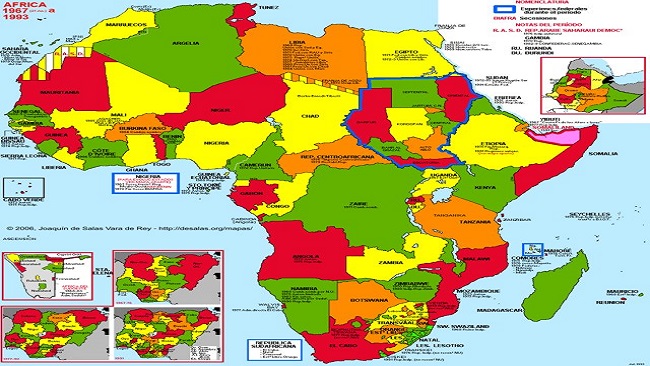Minorities Rights and African States
The major indices in independence talks in the 1940s were central around the rights of minorities and the need to secure such rights in the independent States in Africa. Interesting enough, most of the smaller nations in Africa were involved in fratricidal wars for empire creations in the periods before colonialism. Facts even emerged that colonialisation of African tribes was made easier due to lack of cooperation between warring nations. In Nigeria, the Oyo Empire was still battling the encroachment by Sokoto Caliphate through Ilorin and the Egba insurrection was in its zenith. Divided by its greed to capture and sale more slaves from rival clans, West African nations fell to British and French adventurers with ease.
The Berlin conference after the world war determines the fate of the African nations without any African delegation. Africa was carved based on the greed of colonial masters and states were created without due regards for African nations. Some writers linked this with the balkanization of the Middle East, and India which was done by the same principals. The only facts from these delineation has been persistent conflicts in failing states.
As States created had no popular legitimacy, large armies were needed to maintain the power of leaders. Hence, countries created were gifted standing armies without any real enemies in sight. Lack of real occupation for officers trained for conflict led to plethora of coups in African states within 5 years of independence. Ethnic loyalty became a force in States without basis for unity. The armed forces that were supposed to be the symbols of unity ultimately fell to ethnocentric political agitations. Central governments gradually became a prize for the stronger tribes at the expense of the smaller tribes.
African politics which were ethnically skewed at independence gradually become a means for propagating ethnic agendas. Many pogroms were recorded and as it is in the Middle East and India, Africa gradually became a land of conflicts. From Egypt to South Africa, Nigeria to Mozambique, Congo to Kenya, Algeria to Malawi, ethnic wars disguised as political uprising rained. As conflicts escalated, crime and other illicit economies flowered. Africa suddenly became the be frontier in international crime as poverty and lack of avenue for human development led to high incidence of: human trafficking, drug trafficking, prostitution, kidnapping, armed robbery, and terrorism. The once quiet and safe countries f Africa has grown to become the land of the deadliest terror groups in the world within just a decade.
While the puppet governments in the last decade were propped up with grants and loans for development and the market for local commodities were secured, the fall of communism at the end of the last millennium herald the removal of development aids from Western nations into Africa. Left alone to run an already blotted economy, African leaders for the first time had to prepare viable economic policies based on earned income and this became a great challenge for countries wish had expanded all areas of its expenditures based on foreign aids.
Corruption at the center of governance and a lower resource led to the resurgence of ethnic agitations. The strive to control state resources created another rounds of minorities bashing. Left with no choice, ethnic leaders gradually replaced national leaders in reference and the move to deflate already failing states sovereignty began in earnest.
Government without any proper instruments to manage conflicts resorted to elite securitization model and unleashed the power of the armies on the minority agitators. Increasing violent agitations as more and more ethnic nation joined the fray. From Nigeria, the agitations of the people of Biafra, Niger Delta and other minorities has been going on unresolved for over 30 years while the southern Cameroonian has faced the same persecution from the state as long as anyone could remember.
One very significant fact in these agitations has been the silence of the African Union and the United Nations to the killings and maiming going on in Southern Nigeria and Southern Cameroon for these years. Just like Yemen impasse has been totally ignored while the Yemeni government aided by Saudi Arabia, continues to kill its citizens without any formal sanctions from the Arab Leagues and the UN, West African leaders has been protected from the Right to Protect and other Humanitarian Resolutions that ensures the protection of minorities by these agencies.
Will the world continue to watch as these killings continues in these countries? This was how the whole world concentrated on the Bosnia issues while a pogrom continued in Rwanda. The proliferation of small arms in Africa is a factor to consider. Boko Haram has become a major Terror group in just 12 years with destruction to lives and properties in region of billion dollars, while we all watch.
African states sovereignty is at test in these countries, the right of states to maintain its territorial integrity should not be exclusive and at the expense of the rights of its nationals. We cannot fold our arms while thousands of youths are killed daily for standing up for their rights in Africa. Security issues are global today and should be treated as such by global leaders. The right of minorities should be, protected by us all and we should be seen to be part of the move to create a more viable state for our children in Africa and the world through proper policies and security management.
By Don Michael Adeniji




